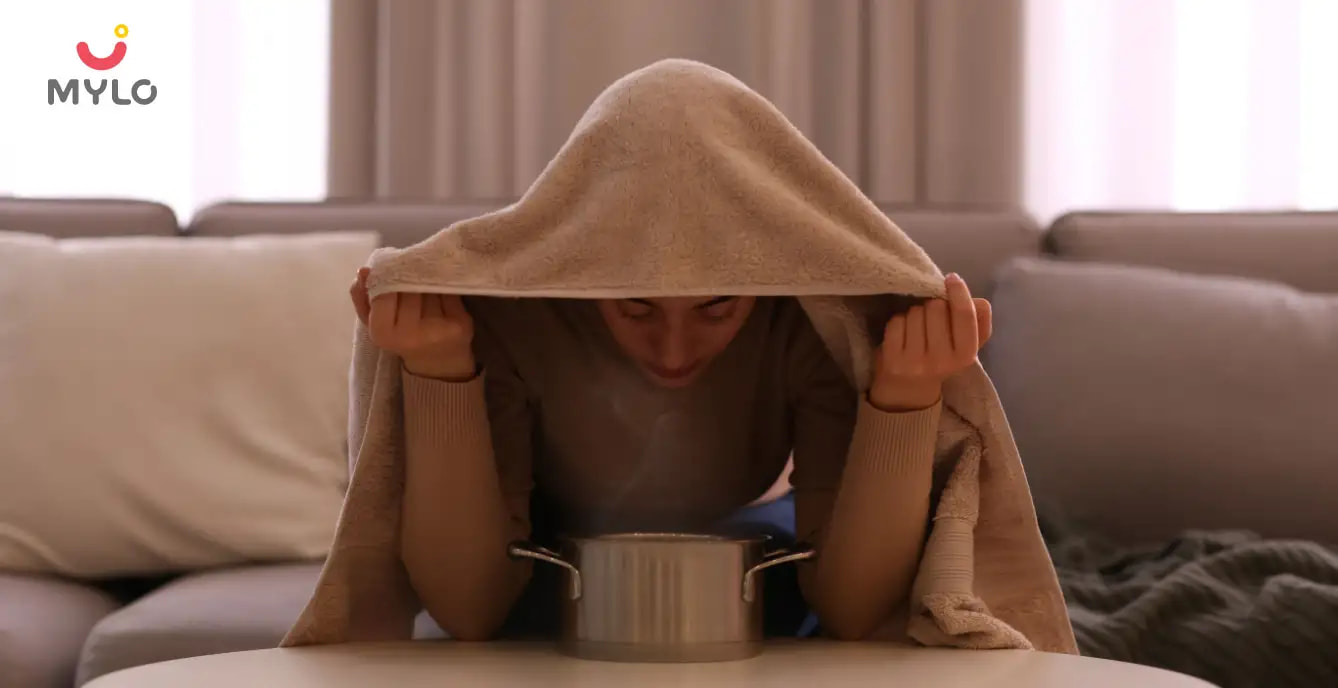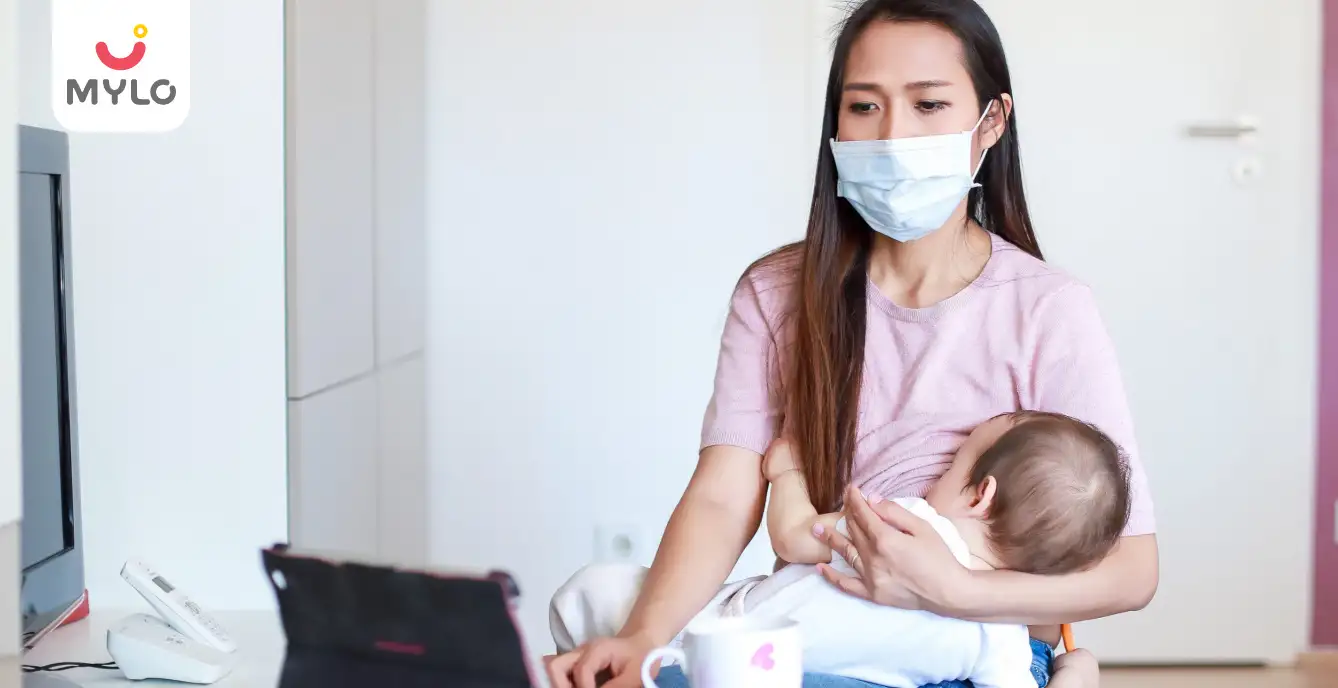Home

Cold & Cough

Home Remedies for Cold During Breastfeeding: How to Keep Both Mom and Baby Healthy
In this Article

Cold & Cough
Home Remedies for Cold During Breastfeeding: How to Keep Both Mom and Baby Healthy
Updated on 4 February 2026
Worrying about passing on a cold to your little one as a breastfeeding mother is common. But don't worry! We've gathered a range of home remedies for cold during breastfeeding and practical tips to help alleviate symptoms, boost your immune system, and ensure a smooth breastfeeding journey even when battling a cold.
Get ready to discover easy-to-implement strategies like Indian home remedies for cold while breastfeeding and cough syrup during breastfeeding. Alongside expert guidance, some mothers also choose trusted postpartum nutrition support like Mylo Lactomama Lactation Granules to complement a balanced breastfeeding diet. Let's dive in…
Is it Safe to Breastfeed When You Have a Cold?
Yes, it is generally safe to continue breastfeeding when you have a cold. Breastfeeding can provide numerous benefits for you and your baby, even when you're under the weather. When you breastfeed, your body produces antibodies in response to the cold virus, passed on to your baby through breast milk. These antibodies help strengthen your baby's immune system and protect against the cold.
Practising good hygiene is essential to minimize the risk of spreading the cold to your baby. Wash your hands frequently, especially before handling your baby or breastfeeding. Consider wearing a face mask if you're concerned about direct respiratory contact with your baby during breastfeeding.
You may also like: Breastfeeding Through Illness: Tips for Nursing Mothers While Sick
Can Your Baby Catch Cold and Cough During Breastfeeding?
Yes, your baby can catch a cold and develop a cough while breastfeeding. When you have a cold, you can transmit the cold virus to your baby through close contacts, such as breathing near them or by coughing or sneezing in their vicinity. Additionally, if the cold virus is present on your hands or other surfaces that come into contact with your baby, they may be exposed.
However, it's important to note that breastfeeding provides valuable immune protection to your baby. When you breastfeed, your body produces antibodies specific to the cold virus you are experiencing, which is passed on to your baby through breast milk. These antibodies help strengthen their immune system and can provide some defense against the cold.
If your baby does develop cold symptoms or a cough, monitor their condition closely. Seek medical advice if their symptoms worsen, if they have difficulty breathing, or if they show signs of dehydration or distress.
Home Remedies for Cold During Breastfeeding
When it comes to managing a cold during breastfeeding, there are several safe and effective Indian home remedies for cold while breastfeeding; you can try to alleviate symptoms and support your overall health.
1. Stay Hydrated
Drink plenty of fluids like water, herbal teas, and clear broths to stay hydrated and help loosen congestion.
2. Warm Saltwater Gargles
Gargling with warm salt water can soothe a sore throat and reduce inflammation. Mix half a teaspoon of salt in a cup of warm water and gargle several times a day.
3. Steam Inhalation
Inhaling steam can provide relief from congestion. Lean over a bowl of hot water (not boiling) and drape a towel over your head to trap the moisture. Breathe deeply for a few minutes.
4. Nasal Saline Drops
Saline nasal drops or sprays can help clear nasal passages and relieve congestion. Use a clean dropper to instil a few drops of saline solution in each nostril.
5. Honey and Warm Lemon Water
Mix honey and freshly squeezed lemon juice in warm water to soothe a sore throat and provide a dose of vitamin C. However, it's important to note that honey should not be given to infants under one year of age.
6. Rest and Sleep
Get plenty of rest to support your immune system and aid recovery.
7. Warm Compresses
Apply a warm compress to your sinus areas or chest to alleviate congestion and ease discomfort.
Consider a healthcare professional before trying home remedies, especially if you have any underlying health conditions or concerns.
Also read : Whooping Cough: Symptoms, Risks & Prevention
Home Remedies for Cough During Breastfeeding
When dealing with a cough during breastfeeding, several safe and natural home remedies can provide relief. Here are some practical options:
1. Honey and Warm Herbal Tea
Mix a teaspoon of honey into a warm herbal tea, such as chamomile or ginger. This can help soothe the throat and provide cough relief.
2. Steam Inhalation
Inhaling steam can help ease coughing and loosen mucus. Fill a bowl with hot water (not boiling), place a towel over your head, and inhale the steam for several minutes.
3. Warm Saltwater Gargles
Gargling with warm salt water can soothe a sore throat and reduce coughing. Mix half a teaspoon of salt in a cup of warm water and gargle several times a day.
4. Stay Hydrated
Drink plenty of fluids, such as water, herbal teas, and clear broths, to stay hydrated and help thin mucus secretions.
5. Elevate Your Head
Keeping your head elevated while sleeping can help reduce coughing at night. Use an extra pillow or raise the head of your bed slightly.
6. Sip Warm Liquids
Enjoy warm liquids like soups, broths, or herbal teas throughout the day to soothe your throat and provide hydration.
7. Rest and Take Care of Yourself
Getting plenty of rest is crucial for your recovery. Take breaks, nap when your baby sleeps, and ask for support from loved ones to ensure you have time to rest and heal.
FAQs
1. Can You Take Cough Syrup During Breastfeeding?
It is recommended to consult with a healthcare professional before taking any cough syrup or medication while breastfeeding. They can guide safe options that will not harm the baby and are compatible with breastfeeding.
2. Is Cheston Cold During Breastfeeding Safe?
Cheston Cold contains multiple active ingredients, including antihistamines, decongestants, and cough suppressants that may pass into breast milk. It is advisable to consult with a healthcare professional before taking Cheston Cold or any other medication to ensure its safety and suitability during breastfeeding.
3. Is it Safe to Take Strepsils During Breastfeeding?
Strepsils tablets contain the active ingredient amylmetacresol and dichlorobenzyl alcohol, which are used to soothe sore throats. Strepsils during breastfeeding are generally considered safe, and it is always recommended to consult a healthcare professional before taking any medication or lozenges.
Final Thoughts
In conclusion, dealing with a cold or cough while breastfeeding can be challenging, but there are safe and effective home remedies for cold during breastfeeding. From herbal teas and steam inhalation to honey and warm saltwater gargles, these remedies can relieve both mom and baby. However, it is essential to consult a healthcare professional before trying any remedies or medications to ensure their safety and suitability during breastfeeding.
References
1. Malapela, R. G., Thupayagale‐Tshweneagae, G., & Baratedi, W. M. (2022). Use of home remedies for treating and preventing coronavirus disease: An integrative review. Health Science Reports.
2. Mitchell, J. L. (1999). Use of Cough and Cold Preparations During Breastfeeding. Journal of Human Lactation.



Written by
Madhavi Gupta
Dr. Madhavi Gupta is an accomplished Ayurvedic doctor specializing in Medical content writing with an experience of over 10 years.
Read MoreGet baby's diet chart, and growth tips

Related Articles
Related Questions
Influenza and boostrix injection kisiko laga hai kya 8 month pregnancy me and q lagta hai ye plz reply me

Hai.... My last period was in feb 24. I tested in 40 th day morning 3:30 .. That is faint line .. I conculed mylo thz app also.... And I asked tha dr wait for 3 to 5 days ... Im also waiting ... Then I test today 4:15 test is sooooo faint ... And I feel in ma body no pregnancy symptoms. What can I do .

Baby kicks KB Marta hai Plz tell mi

PCOD kya hota hai

How to detect pcos

RECENTLY PUBLISHED ARTICLES
our most recent articles

Fever During Breastfeeding: Tips from Experts for New Moms

Side Effects of Breastfeeding While Lying Down: Is It Worth the Risk?

17 Foods to Avoid While Breastfeeding: Expert Guide for New Moms
Diapering
What to Pack and What to Skip When Travelling with a Baby
Infant
How Baby Sleep Patterns Change in the First Year and What Parents Can Do
Diapering
Choosing the Best Baby Diapers in India for a Rash-Free, Happy Baby
- What Kind of Diapers for Babies Keep The Little One's Comfortable, Dry and Happy
- Indian Food Chart for Your 10-Month-Old Baby – Week 1
- 10 Month Old Baby Food Chart/Meal Plan – Week 2
- 10 Month Old Baby Food Chart/Meal Plan – Week 3
- Indian Food Chart for Your 8-Month-Old Baby – Week 1
- Best Christian Baby Boy Names That Are Unique and Timeless 2026
- The Ultimate Collection of Girl Baby Names in Tamil 2026
- Yellow Discharge Before Period: Is It Normal or a Cause for Concern?
- Evaporation Line vs Faint Positive: The Ultimate Guide to Pregnancy Test Results
- How to Check Pregnancy at Home with Fingers?
- North Indian Diet Plan for New Moms (0–6 Months Baby)
- North Indian Diet Plan for Mothers (6+ Months Baby)
- South Indian Diet Plan for New Moms (0–6 Months Baby)
- South Indian Diet Plan for Mothers (6+ Months Baby)


AWARDS AND RECOGNITION

Mylo wins Forbes D2C Disruptor award

Mylo wins The Economic Times Promising Brands 2022
AS SEEN IN

- Mylo Care: Effective and science-backed personal care and wellness solutions for a joyful you.
- Mylo Baby: Science-backed, gentle and effective personal care & hygiene range for your little one.
- Mylo Community: Trusted and empathetic community of 10mn+ parents and experts.
Product Categories
baby carrier | baby soap | baby wipes | stretch marks cream | baby cream | baby shampoo | baby massage oil | baby hair oil | stretch marks oil | baby body wash | baby powder | baby lotion | diaper rash cream | newborn diapers | teether | baby kajal | baby diapers | cloth diapers |




